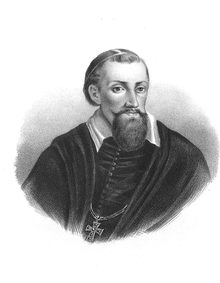Andrzej Krzycki
Andrzej Krzycki Herb Kotwitcz (born July 7, 1482 in Krzycko , † May 10, 1537 in Skierniewice ) was the Archbishop of Gniezno and Primate of Poland . He also worked as a writer during the Renaissance .
Life
He completed his training at the University of Bologna , where he studied under well-known humanists, and began his career in the church hierarchy in 1501. In 1512 Barbara Zápolya married King Sigismund I , whereupon Krzycki wrote her a few verses in memory of the wedding and became her secretary that same year.
When the king won the battle of Orsha , he wrote another poem - supposedly written by the queen - and sent it to her absent husband, following the example of Ovid's Epistolae Heroidum . In a letter to Krzycki, Erasmus of Rotterdam extolled these verses.
After Queen Barbara's death, he continued his work at court as Chancellor in the household of Bona Sforza , Sigismund's second wife. He took on various offices and succeeded in obtaining profitable benefices, such as the diocese of Płock in 1527 .
He was hostile to the Reformation , which was spreading around his time , and was the occasion for him to write his most serious work, Religions et Reipublicae quaerimonia . When Albrecht von Brandenburg-Ansbach , Grand Master of the Teutonic Order , became a Lutheran and Sigismund I recognized him as his vassal and Duke of Prussia in 1525 , Krzycki tried to explain and justify his sovereign's actions in a letter to Baron Pulleon.
Most recently he held the highest ecclesiastical office in Poland, that of Archbishop of Gniezno and thus that of the Primate of Poland . He also acted as a promoter of young talent, as in the case of Klemens Janicki . In his last work De Asia Dieta he criticized the Polish assemblies and conventions of his time.
Web links
| personal data | |
|---|---|
| SURNAME | Krzycki, Andrzej |
| BRIEF DESCRIPTION | Polish archbishop and writer of the Renaissance |
| DATE OF BIRTH | July 7, 1482 |
| PLACE OF BIRTH | Krzycko |
| DATE OF DEATH | May 10, 1537 |
| Place of death | Skierniewice |

